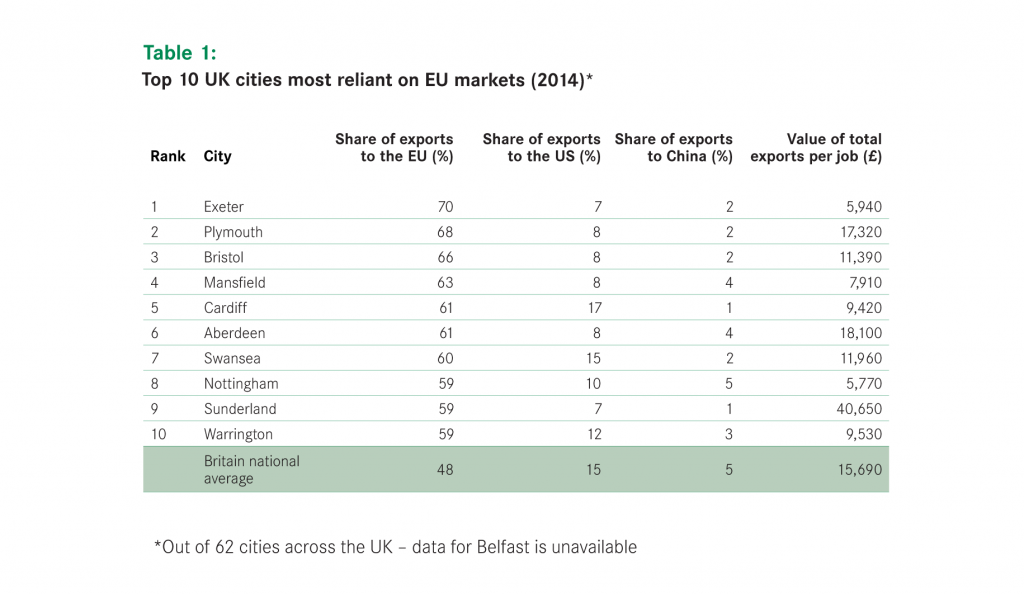Cities Outlook 2017, the Centre’s annual health-check on the UK’s largest city economies (published today), focuses this year on the geographical and industrial make-up of UK city exports, in the context of the vote for Brexit in last year’s EU referendum.
It reveals that the EU is the biggest export market for 61 out of 62 British cities (1) – with only Hull selling more goods and services to a different destination (the US). Two thirds of British cities (41 out of 62) trade half or more of their exports to the EU, with even Derby – the city least reliant on EU markets – still selling a quarter of its exports to EU countries.
The report also shows that British cities would have to dramatically increase trade with other international markets to compensate for a downturn in exports to the EU. For example, to make up for a 10% decrease in exports to the EU, British cities would have to nearly double exports to China, or increase exports to the US by nearly a third (31%).


The report highlights a number of other important findings which should be key considerations for the Government in trade negotiations with the EU and other parts of the world, and in its forthcoming industrial strategy:
- In total, nearly half of all exports from British cities (46%) go to EU markets – three times more than the USA, the second biggest market for UK urban exports, and five times more than exports to India, Japan, Russia, South America and South Korea combined.
- Britain’s top exporting city is Sunderland, with £40,650 worth of exports per worker in 2014, followed by Worthing (£29,640) and Slough (£27,560), while London is the 5th biggest exporter per worker (£23,470). In contrast, York has the smallest export-base per worker (£3,710). Four other Yorkshire cities are also among the bottom ten places for total exports, reflecting the region’s low level of exports per job overall.
- Sunderland is also one of only seven cities which are heavily reliant on a specific industry for the majority of their exports (car-making in Sunderland’s case). However, in the vast majority of British cities, exports come from a wide range of sectors. This means that broad trade agreements will be required to help all cities sustain and grow their export base.
- There is a North/South divide when it comes to the types of exports British cities specialise in. Places in the North and Midlands mainly export goods, which make up almost 90% of exports from Derby and Hull for example. Southern cities have a much greater reliance on exporting services, with nine out of the top British ten cities for services exports located in the South of England.
Commenting on the findings of the report, Alexandra Jones, Chief Executive of Centre for Cities said:
“Securing the best possible EU trade deal will be critical for the prosperity of cities across Britain, and should be the Government’s top priority as we prepare to leave the single market and potentially the customs union. While it’s right to be ambitious about increasing exports to countries such as the US and China, the outcome of EU trade negotiations will have a much bigger impact on places and people up and down the country.
“It’s also important that the Government aims to reach trade agreements covering as many sectors as possible, rather than prioritising deals for high-profile industries based in a small number of places. Broad trade agreements for all goods and services will help every city to build on its exporting strengths.
“The UK faces a major challenge in boosting productivity and wages, and increasing the value and volume of city exports will be crucial in addressing those issues. National and local leaders need to consider how they can make cities more attractive to exporting firms. Improving skills and infrastructure across the UK will be vital in this, and should be a central part of the Government’s industrial strategy.”
ENDS
For more information or to set up an interview, please contact Brian Semple, Head of Communications for the Centre for Cities, on 0207 803 4316 / 07595 439 638 or b.semple@centreforcities.org
NOTES TO EDITORS
- Data on exports per job is not available for Belfast
Cities Outlook and the Centre for Cities
Cities Outlook is the authoritative annual economic index of the UK’s 63 largest cities and towns, produced by the Centre for Cities – an independent, non-partisan research and policy institute. Committed to helping UK cities improve their economic performance, the Centre produces practical research and policy advice for city leaders, business and Whitehall.
Report data sources:
Data was taken from HMRC’s regional trade data and ONS estimates of services exports by region. To move from regional to city level estimates, the regional data was apportioned according to the regional share of jobs in each city.



